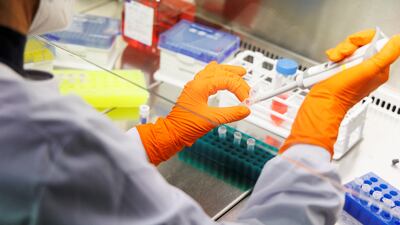Two years of Covid-19 have well prepared the Mena region’s healthcare apparatus to deal with monkeypox, the World Health Organisation said on Thursday.
After the detection of monkeypox infections in two Mena countries — the UAE and Israel — this week, concerns are rising over the spread of the disease in nations where it is not endemic.
Speaking at an event for the organisation’s Eastern Mediterranean region (EMRO) on Thursday, officials reiterated their confidence that thus far, there is no need to panic over the rise in the number of cases.
EMRO director Dr Ahmed El Mandhari said the response to Covid-19 had stood the region in good stead to deal with the latest disease outbreak. He said a “much stronger position” had been created, “which has improved our capacity in the areas of surveillance and laboratory diagnosis, allowing us to more effectively identify and confirm cases before the virus spreads further".
But EMRO did express concerns over researchers’ inability to ascertain the exact cause of the recent apparent increase in human-to-human transmissibility of the virus, which they suspect is the main reason it is spreading quickly to non-endemic countries.
After the discovery of the first cluster of infections this month, researchers studied the genetic material of the virus, the WHO said. They found it was an exact match to samples taken from patients who were infected when the disease was first discovered in humans in 1970, meaning the virus has not mutated.
This is what is particularly confusing to researchers, said Dr Abdinasir Abubakar, a WHO infectious disease prevention specialist who said that more research was needed to explain why the rate of human-to-human infections has risen.
As it stands, the WHO is confident that the recent outbreak can be effectively managed through contact tracing and wide-scale campaigns to educate people on what to do should they get infected. The organisation expressed its confidence that because the disease has a low mortality rate with most infections being mild, it will not become a problem anywhere near as large as Covid-19.
Despite maintaining an optimistic outlook on the disease, Dr El Mandhari stressed the importance of expediently controlling transmission, which he said can be accomplished through rigorous contact tracing.
Though existing vaccines for smallpox have a high degree of efficacy against monkeypox, the WHO said it does not yet recommend that countries launch mass vaccine drives for the illness.
The organisation did recommend, however, that anyone suspected of having the disease should check themselves into hospital as soon as possible.
However, manufacturers are stepping up production of vaccine doses amid requests by several countries for an ample stock of immunisation against the illness.
The monkeypox virus is endemic to central and western Africa, where sporadic infections occur each year, the bulk of which are animal-to-human infections, said Dr Abubakar.
Dr El Mandhari said that health care must remain a priority for world governments, as "monkeypox is a stark reminder that the world will continue to face outbreaks of emerging and re-emerging diseases".
He concluded by stressing the importance of protecting healthcare workers around the world, who will most likely come into more contact with the disease than the average person.


